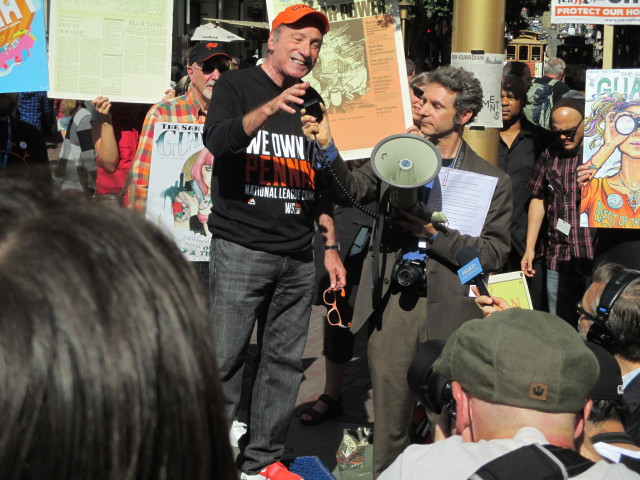
By Tim Redmond
OCTOBER 23, 2014 – We got quite a crowd for the Save the Bay Guardian rally at noon today – at least 75 people, maybe 100. I got to see a lot of my old friends, heard Victor Krummenacher and Tommi Avicolli Mecca sing songs, and got a sense of how many progressive leaders in the community (starting with Assemblymember Tom Ammiano) saw the Guardian as a crucial community institution.
A lot of the attention during and after the event was on the archives – the digital and print history of modern progressive San Francisco, as recorded over the past 48 years by the Left’s newspaper of record.
I don’t know what’s going to happen to the paper; I have no idea how much the current owners would be willing to sell it for (I suspect they don’t want any real competition for the SF Weekly, which they also own, so they aren’t going to make it easy for someone to take the Guardian over). I know that a lot of us are concerned about the archives, which belong in a university library somewhere where they can be preserved, protected, and made accessible to researchers.
I’m also concerned about this (convenient) line that’s going around that somehow the demise of the Bay Guardian is a sign of the demise of the Left in San Francisco.
Heather Knight, in the Oct. 19 Chronicle, noted that “the city’s storied progressive movement has been hemorrhaging for years.”
Check this out:
“For decades, San Francisco progressives steered the political agenda on everything from rent control to stopping freeways from running through neighborhoods to gay rights, but they seem to have lost power, people, and issues to fight in the past few years.”
She referred to the “whack-a-mole attempts to block Google buses and force Airbnb to pay back taxes”
Randy Shaw took this on from his perspective a couple of days ago, but let me add some history. Because I was here through most of the period that Knight writes about, and I’m still here now, and I think she’s got a lot of it wrong.
When I started working as a political reporter in this town, in 1982, you could hardly say that progressives were “steering the agenda.” Dianne Feinstein was mayor; she did everything the Chamber of Commerce wanted. She opposed domestic partnership rights for same-sex couples, vetoed a bill to extend rent controls to vacant apartments, and even vetoed a resolution calling for “reproductive rights day.”
The progressives had, on a good day, two or three votes on the Board of Supervisors, which was elected citywide and completely dominated by development and landlord interests.
Rent control came about in San Francisco in significant part because landlords like Angelo Sangiacomo were raising rents on rich people. There were rarely six votes on the board for any progressive causes.
The Planning Commission, Police Commission, and other powerful panels were all controlled entirely by the mayor. Not once did Feinstein’s planners ever turn down a highrise office building proposal.
It’s really hard to argue that progressives were “steering the agenda” in those days.
The victory of Prop. M at the ballot in 1986 – driven by progressive leaders – and the election of Art Agnos in 1987 were signs that the Left had life. But Agnos didn’t have six votes on the board for his agenda much of the time.
Some of the biggest victories of that era were in the courts (thanks to Sue Hestor) and at the ballot.
In terms of citywide organizing on a wide range of issues, it wasn’t until the late 1990s (and the return of district elections) that the progressives were really in charge.
And even then, we were up against Mayor Gavin Newsom, who was a foe to almost all progressive legislation. Again, many of the victories were won at the ballot box. Except for the four years when Agnos was in office (during which a lot of progressives were still frustrated) the Left has never held Room 200 City Hall. (I know, Shaw thinks Ed Lee is a progressive. I disagree. If he were, he’d be endorsing Prop. G and David Campos.)
And now we’re supposed to believe that the Left is dead?
Actually, compared to the early 1980s, and even parts of the 1990s, the left today is unusually energized, organized, and effective. We stopped 8 Washington. We won the Battle of the Waterfront. We passed some of the most aggressive anti-eviction legislation that any city could possibly enact. Hey, protests even stopped an eviction.
Everywhere I look around the city, there are progressive organizers working on issues. There are immensely talented people fighting the good fight on every level.
Yes, the demographics of the city are changing. Maybe the tech boom will eventually drive out everyone who thinks like me, and the newcomers will all be libertarians who want less government and love property rights and low taxes. But I think it’s way too early to write the obituary for the San Francisco progressives.
We aren’t winning everything; we never do. As my friends in the labor movement constantly remind me, the struggle never ends.
But it’s not over, not in any way.
And just on a personal level, I want to note that the alternative press isn’t dead in San Francisco. After all, you’re reading this.






